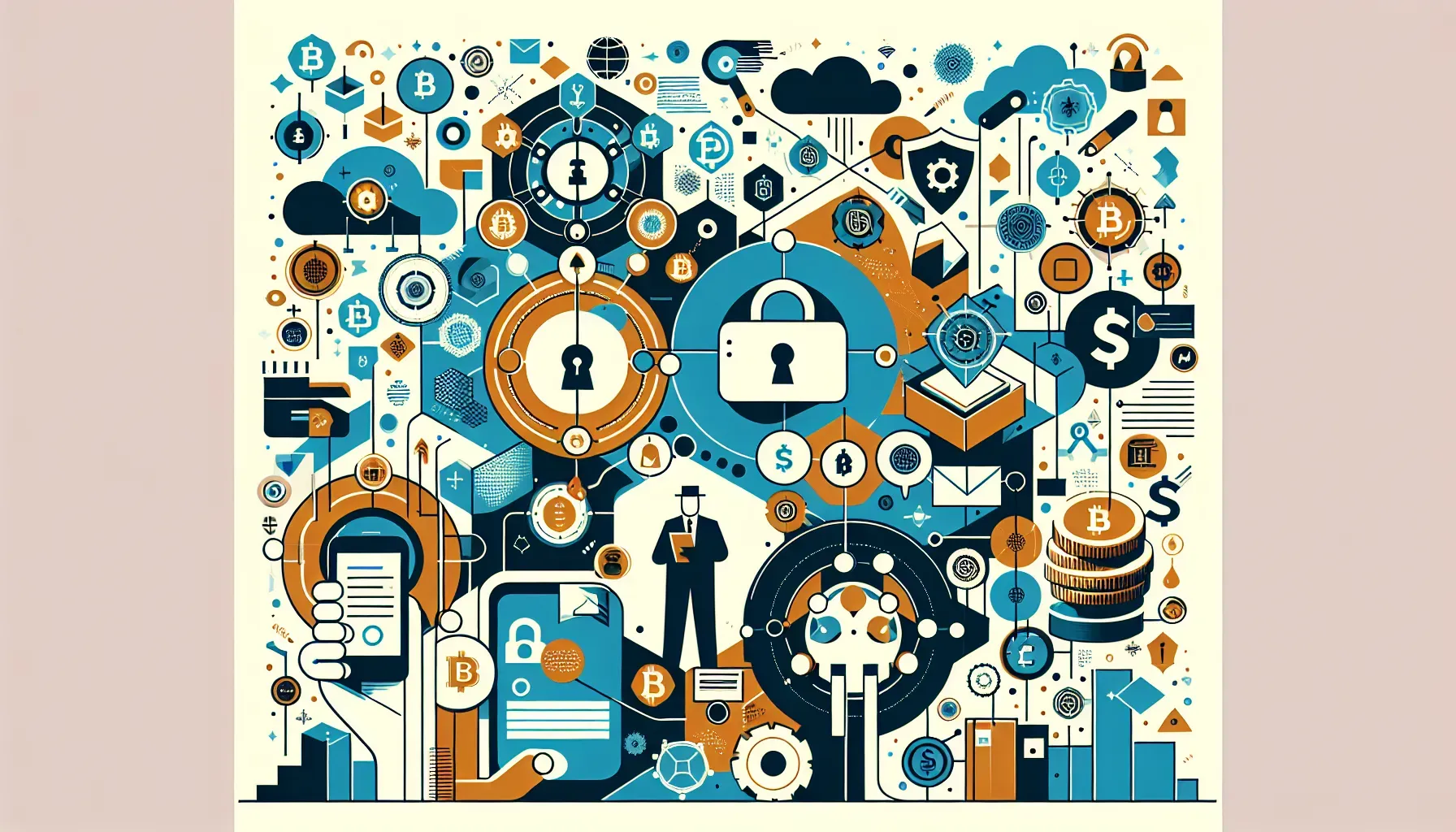Blockchain-Powered Wealth Identity Protection: Reinventing Asset Security in the Digital Era

In today's rapidly evolving digital landscape, safeguarding one's wealth and assets has become more challenging than ever. As traditional methods of asset protection face unprecedented threats from cybercrime and fraud, individuals are seeking innovative solutions to fortify their financial security. Amid this paradigm shift, blockchain technology has emerged as a pioneering force in redefining wealth identity protection in the digital era.
Decentralized Identity Verification: Enhancing Asset Security
Blockchain, the underlying technology behind cryptocurrencies such as Bitcoin and Ethereum, has transcended its initial applications to revolutionize asset security through decentralized identity verification solutions. By leveraging the immutable nature of distributed ledgers, blockchain offers a paradigm-shifting approach to ownership verification in asset transactions.
Traditional asset records are susceptible to manipulation and unauthorized alterations, posing inherent risks to ownership rights and provenance. In contrast, blockchain technology ensures tamper-resistant asset records by storing them on distributed ledgers, where each transaction is permanently recorded and linked to previous ones. This immutable ledger establishes an unassailable record of asset ownership, mitigating the threat of fraudulent alterations and enhancing trust in transaction veracity.
The Importance of Immutable Records in Asset Transactions
Blockchain's role in safeguarding ownership rights and provenance extends beyond individual transactions, encompassing entire chains of custody for assets. Whether it's real estate holdings, intellectual property rights, or valuable commodities, blockchain's immutable asset records provide an irrefutable provenance trail, bolstering confidence in the legitimacy and history of owned assets.
Wealth transfer planning often involves intricate legal frameworks and intermediaries to ensure the secure execution of financial transfers. However, blockchain introduces a disruptive innovation in the form of smart contracts – self-executing contracts with the terms directly written into code. Smart contracts automate and enforce the negotiation or performance of a contract, effectively streamlining wealth transfer processes while minimizing the need for intermediaries.
By encoding predefined conditions and mutual obligations into these digital agreements, smart contracts enable seamless, secure, and transparent wealth transfers. The automation capabilities inherent to smart contracts not only accelerate transaction processing but also significantly reduce the potential for errors or disputes, thus fortifying the integrity of wealth transfer planning.
Related Article: Unleashing Fintechs Potential in Wealth Management Strategies
How Smart Contracts Revolutionize Wealth Transfer Planning
The proliferation of digital assets, including cryptocurrencies and tokenized securities, has accentuated the imperative for robust security measures in asset management. Crypto wallets serve as repositories for these digital assets, accentuating the criticality of fortifying their security against cyber threats. Multi-factor authentication (MFA) emerges as a pivotal security augmentation tool for crypto wallets, effectively elevating the standards for digital asset management.
MFA leverages a combination of multiple authentication factors – such as knowledge (passwords), possession (smartphones), and inherence (biometrics) – to validate users' identities before granting access to crypto assets. By integrating MFA into crypto wallets, blockchain enthusiasts can enhance their asset management security while mitigating the risks posed by unauthorized access attempts and identity breaches.
Implementing Multi-Factor Authentication for Crypto Wallets
Asset inheritance has traditionally been encumbered by complex probate processes and administrative hurdles, potentially leading to prolonged legal battles and inheritance disputes. However, blockchain-based asset inheritance protocols offer a progressive framework for ensuring transparent and efficient wealth transfer to beneficiaries.
By encoding inheritance arrangements into immutable smart contracts on a blockchain network, individuals can establish clear directives for wealth distribution while minimizing the scope for ambiguity or contention. The transparent nature of blockchain-based asset inheritance protocols not only expedites the transfer process but also fosters heightened trust among involved parties, thereby mitigating potential familial discord arising from ambiguous or contested inheritances.
Related Article: Digital Wealth Management: The Intersection of Human Expertise and Automated Solutions
Blockchain Protocols for Efficient Asset Inheritance
Property rights have historically been subject to regulatory complexities and susceptibility to fraudulent encroachments. Decentralized asset titling systems leverage distributed ledger technology to redefine property rights protection by establishing incorruptible records of ownership on a decentralized network.
By anchoring property titles on immutable ledgers, blockchain circumvents vulnerabilities associated with centralized record-keeping systems prone to corruption or unauthorized alterations. The introduction of decentralized asset titling systems not only fortifies property rights against fraud but also fosters increased accessibility and transparency in property ownership data—an indispensable step toward engendering trust in real estate transactions while diminishing the prevalence of property title disputes.
As technological innovation continues to reshape conventional paradigms of wealth identity protection, blockchain stands at the vanguard of this transformation. Through decentralized identity verification solutions, immutable asset records on distributed ledgers, smart contracts for wealth transfer planning, crypto wallet multi-factor authentication, blockchain-based asset inheritance protocols, and decentralized asset titling systems—blockchain has emerged as a catalyst for reinventing asset security in the digital era.
Frequently Asked Questions
Decentralized identity verification solutions utilize blockchain technology to enhance ownership verification in asset transactions. By employing distributed ledgers, these solutions provide a secure and tamper-resistant method for confirming asset ownership, thereby reducing the risk of fraud and increasing trust in financial transactions.
Immutable asset records stored on distributed ledgers ensure that ownership information is tamper-proof and permanently linked to previous transactions. This enhances trust in the legitimacy of asset ownership, reduces the risk of fraudulent alterations, and provides a reliable provenance trail for various assets.
Smart contracts automate the execution of agreements by encoding terms directly into code. This innovation streamlines wealth transfer processes, minimizes the need for intermediaries, and reduces potential errors or disputes, thereby enhancing the security and efficiency of financial transfers.
Multi-factor authentication (MFA) enhances crypto wallet security by requiring multiple forms of verification before granting access. By combining knowledge (passwords), possession (smartphones), and inherence (biometrics), MFA significantly mitigates risks associated with unauthorized access and identity breaches in digital asset management.
Blockchain-based asset inheritance protocols utilize smart contracts to establish clear directives for wealth distribution among beneficiaries. By ensuring transparency and minimizing ambiguity, these protocols expedite the inheritance process while fostering trust among parties involved, reducing potential disputes over assets.
Decentralized asset titling systems leverage distributed ledger technology to create incorruptible records of property ownership. By anchoring titles on immutable ledgers, these systems protect against fraud and unauthorized alterations, enhancing transparency and accessibility in property ownership data, which is crucial for real estate transactions.
Blockchain is transformative for asset security due to its ability to provide decentralized identity verification, immutable records, and automated processes through smart contracts. These features collectively enhance trust, reduce fraud risks, and streamline transactions in an increasingly digital financial landscape.
Individuals and organizations managing valuable assets can benefit from blockchain-powered wealth identity protection. This includes real estate owners, investors in intellectual property, and cryptocurrency holders who seek enhanced security measures against fraud while ensuring transparent ownership verification throughout their transactions.
Yes, blockchain technology can significantly mitigate risks associated with cybercrime by providing secure, tamper-resistant records of transactions. Its decentralized nature makes it difficult for malicious actors to alter data, thus enhancing overall security in digital asset management and protecting individuals' wealth from cyber threats.
Check Out These Related Articles

Architectural Wealth: Designing Financial Fortunes with Imagination and Precision

The Power of Personal Anecdotes in Wealth Management

Robo-Advisors 2.0: The Evolution of AI-Powered Wealth Management

